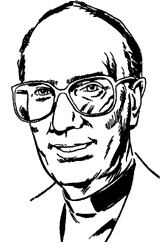
 MICHAEL TURNBULL
MICHAEL TURNBULLBishop of Durham
If you believe that Dr Carey's policies will be the salvation of the Church of England, Michael Turnbull is your only candidate. And there is no doubt that Turnbull is able, energetic and personally nice.
He was the architect of the Carey reforms, and in his original plans the whole Church of England, money and everything, would have been run by the central committee; the Church Commissioners would have been left as a powerless husk, and their money transferred from the control of Parliament to that of the Church itself.
It was an extraordinarily bold and decisive solution to a great many problems and if it had come off would have been a tremendous feat of disestablishment. But it didn't. The Church Commissioners remained in existence, and in control of the money. This was not Turnbull's fault. He devised the plan; he did not execute it.
He is the epitome of management in the Church, fast-tracked from his early years as chaplain to the Archbishop of York, through Rochester and on to Durham, where with hindsight he was most likely successor to David Jenkins, because he was of all bishops the least like him. Where Jenkins had got himself into notorious difficulties about the resurrection, Turnbull said straight out that he wished there had been a video camera there.
With similar straightforwardness, he condemned homosexual priests, which made it all the more embarrassing when the News of the World unearthed a conviction of his own for cottaging in Hull when he was Archbishop's chaplain. The thing was hushed up at the time so successfully that when a brother bishop went to the newspaper library in Colindale to check it out, he found no copies of the relevant pages of the local paper.
Turnbull's association with Durham is suitable too in that it was by tradition the grandest of the English sees outside Canterbury and York. Until 1831, the prince bishops had their own army (small) to repel the Scots; they were the greatest survivors of medieval power in the Church of England.
Under David Jenkins, the see was a symbol of the power of dons to do what they liked. Now, with Turnbull's talk of management and leadership, he is the strongest advocate of running the Church after the model of modern power holders, the corporations. That is certainly one model for evangelical churches – though it is very notable that no Western church run on those lines has managed to grow and keep its discipline, however well it suits individual congregations. But this may not matter; dealing with growth is not the most urgent problem facing the Church of England.
Top of Page | Next Archbishop | Archive | SOF Home
Illustration: John Richardson / Funny Business
© Ship of Fools 2000